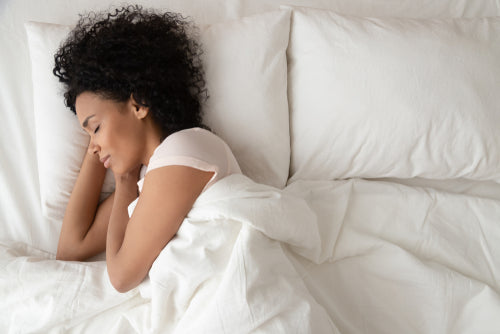If you’ve ever felt more relaxed after inhaling the gentle aroma of lavender or chamomile, you’re not imagining it. Research shows that calming scents can significantly improve sleep quality by reducing stress, lowering heart rate, and creating a more peaceful sleep environment. For centuries, people have turned to aromatherapy for sleep support, and now science is confirming what ancient traditions already knew.
In this guide, we’ll explore the top 11 calming scents that are scientifically backed to help you fall asleep faster, sleep deeper, and wake up more refreshed. Whether you're using essential oils for better rest, pillow sprays, or natural fragrance diffusers, these powerful botanicals can support a more restful night.
How Scents Affect Sleep
The secret behind how scent influences sleep lies in the brain’s limbic system, the region responsible for controlling emotions, memory, and behavior. When you inhale certain calming aromas, your olfactory system sends signals directly to this emotional center—impacting mood, reducing stress, and helping prepare your body for sleep.
Aromatherapy for sleep works by activating the parasympathetic nervous system, which slows down your heart rate, lowers blood pressure, and helps shift the body into a relaxed state. Many sleep-enhancing scents contain active compounds like:
- Linalool (found in lavender) – known for its anti-anxiety effects
- Cedrol (found in cedarwood) – supports deeper, longer sleep
- Apigenin (in chamomile) – binds to brain receptors to promote sedation
Understanding these mechanisms helps explain why certain calming fragrances are so effective in promoting better sleep naturally.
Top Calming Scents for Sleep

Not all scents are created equal when it comes to promoting deep, restorative rest. These scientifically backed calming fragrances have shown proven results in both clinical studies and traditional sleep rituals, and can help rewire your stress response:
1. Lavender
The most researched essential oil for sleep, lavender helps reduce anxiety, lower heart rate, and promote deeper sleep. Ideal in pillow sprays, diffusers, or bath blends.
2. Chamomile
With its soft, herbal aroma, chamomile contains apigenin, a compound that relaxes the brain and encourages drowsiness. Common in both teas and aromatherapy sleep aids.
3. Sandalwood
Rich and woody, sandalwood essential oil has sedative effects shown to help insomniacs fall asleep faster. Use in a diffuser or blend with lavender for added calm.
4. Valerian
This earthy scent affects GABA receptors in the brain, helping to reduce restlessness and promote deep, uninterrupted sleep.
5. Cedarwood
Known for its cedrol compound, cedarwood has been shown to increase total sleep time and reduce night-time awakenings. Use consistently for best results.
6. Jasmine
Sweet and floral, jasmine soothes the nervous system and lowers anxiety—making it one of the best natural scents for restful sleep.
7. Bergamot
Though a citrus oil, bergamot has balancing properties that help regulate cortisol levels and support healthy sleep patterns.
8. Ylang Ylang
Floral and slightly fruity, ylang ylang has anxiolytic and sedative effects, helping to ease both mind and body before bed.
9. Rose
A gentle floral scent with stress-reducing benefits, rose essential oil is often used in hospital studies for promoting sleep in sensitive or high-stress environments.
10. Vanilla
Warm, sweet, and nostalgic, vanilla can help lower blood pressure and create a soothing bedtime atmosphere that enhances relaxation.
11. Sweet Marjoram
Herbal and slightly spicy, this lesser-known oil has strong sedative properties and is prized for supporting deep, restorative sleep.
How to Use These Scents for Better Sleep

You can incorporate calming sleep scents into your nightly routine in several effective ways:
- Diffusers: Use ultrasonic or cold-air diffusers with 100% pure essential oils to fill your room with a soft, sleep-inducing aroma.
- Pillow sprays & linen mists: Lightly mist your pillow or sheets with a calming scent like lavender or rose.
- Bath soaks: Add essential oils to warm bath water (with a carrier oil) for a calming pre-bed ritual.
- Topical oils or roll-ons: Apply diluted blends to pressure points like wrists, neck, or temples before bedtime.
For best results, use your chosen scent 30–60 minutes before sleep, and be consistent—creating a fragrance-based bedtime ritual helps train your brain to associate these aromas with relaxation.
Evidence-Based Highlights
Numerous studies and expert organizations support the effectiveness of these calming scents for sleep. Here are a few key highlights:
- According to the Sleep Foundation, essential oils like lavender, chamomile, and bergamot are among the most effective for improving sleep quality and reducing anxiety.
- A 2021 NCBI study on aromatherapy and sleep confirmed that certain scents, especially lavender and cedarwood, improved sleep duration and efficiency in both adults and the elderly.
- Well+Good highlights jasmine, valerian, and sweet marjoram as under-the-radar oils that work surprisingly well for promoting relaxation and restful sleep.
These findings validate what many aromatherapy practitioners have long known: scent is a powerful tool in supporting emotional calm and physical rest.
Conclusion
When it comes to better rest, fragrance is more than just ambiance—it’s a proven, natural sleep aid. Whether you prefer the floral softness of jasmine, the cozy warmth of vanilla, or the grounding calm of sandalwood, the right scent can help you drift off more easily and wake up feeling truly refreshed.
Try a few of these top calming scents for sleep to discover what works best for your body and bedtime routine. With consistent use and a mindful approach, aromatherapy can become a soothing signal to your brain that it’s time to unwind.
💤 Your best night’s sleep could be just a scent away.
FAQs: Calming Scents for Better Sleep
1. What is the best scent for insomnia?

Lavender is widely considered the best essential oil for insomnia, thanks to its proven ability to reduce anxiety and promote deep rest. For an effortless nightly ritual, try our Encore Room Spray (Rose | Sea Lotus | White Musk), which blends calming notes ideal for winding down. Looking for something with lavender and elegance? Explore our Sparkling Tuberose Diffuser, featuring subtle floral and vanilla notes that create a sleep-ready atmosphere.
2. Can I combine calming scents for sleep?
Yes! Blending scents like lavender with cedarwood or chamomile with sandalwood enhances the effects of both. Try layering our Wood Mood Diffuser (Violet | Vetiver | Wooden) with the Pomelo Vanille Linen Spray (Orange | Vanilla | White Musk) for a tranquil, multi-sensory experience that supports both relaxation and sleep.
3. How long before bed should I use calming scents?
Apply or diffuse 30 to 60 minutes before bedtime to signal your body it's time to rest. Our Ultradrop Micro Mist Diffuser paired with the Parfum Régis Aroma Oil (White Lily | Quince | Cherry Blossom) allows you to effortlessly scent your space on a timer, syncing perfectly with your wind-down routine.
4. Are essential oils safe for children at bedtime?
Yes, but always choose gentle, kid-safe scents like lavender and chamomile, and ensure they’re properly diluted. For a safe and soothing option, consider using our Le Petit Voyage Diffuser in a child’s room with a soft fragrance like Encore or Parfum Régis, both of which create a peaceful bedtime setting.
5. What’s the best way to use essential oils for sleep?
Diffusing is the most effective method, followed by pillow sprays, linen mists, and topical roll-ons (if diluted). Our Linen Refreshers are an easy, no-fuss way to bring calming aromas into your bedtime routine. Spritz Poppy Valley (Ambrette | Poppy Seed | Tonka Beans) onto your sheets or pillow to create a comforting, sleep-inducing scent cloud.








